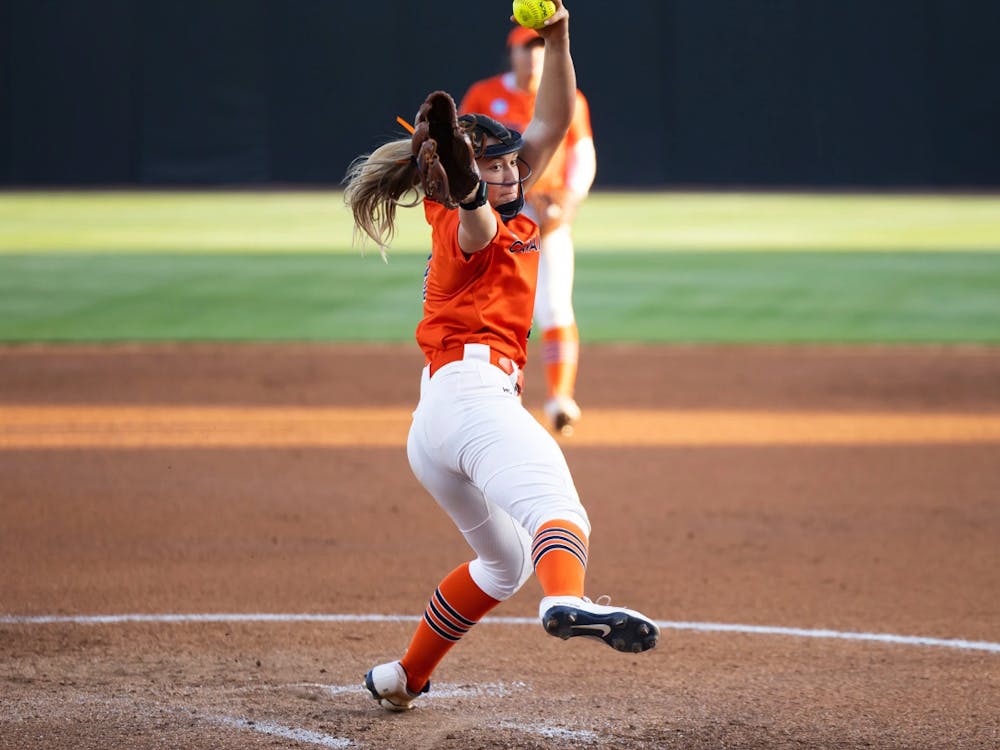Though the vast majority of the 50,081 fans who flocked to Scott Stadium donned orange for Virginia’s first home football game of the season, the color gray most defined the Cavaliers’ 43-19 win against Richmond Saturday.
Gray, the color of the sky at kickoff on a muggy afternoon in Charlottesville.
Gray, the color of the empty seats that stubbornly remain a staple at Virginia home games.
Finally, gray, the color that personifies the murky ramifications of what for the Cavaliers was both a resounding, season-opening win and an irritatingly imperfect performance against a rebuilding FCS team.
Those Virginia fans of the glass half-full persuasion, noting that Virginia racked up 545 yards of offense and limited Richmond to 28 yards rushing, would likely deem Saturday’s win the perfect start to another successful year.
The more cynically inclined, however, would describe a game that failed to alleviate several nagging concerns about Virginia’s ability to compete for an ACC Championship. Count Coach Mike London and me as two who believe this season-starting win signifies something in between.
“Now we just have to make sure we take care of the things that kind of hampered us a little bit and get ready for our next opponent,” London said.
“For the most part, we had 500 … total yards, and that is an accomplishment. But as I said, we have a long ways to go.”
The performance of the offense is a case in point. Before you could say “Wahoowa,” touchdown machine Kevin Parks had vaulted over the goal-line for an acrobatic one-yard score and Darius Jennings had humiliated Spider defensive backs on an incendiary 51-yard touchdown catch-and-run to make it 16-0. Though the Virginia offense fell off that torrid pace as the game wore on, the dynamism of the team’s playmakers — including the aforementioned Parks and Jennings, running back Perry Jones, wide receiver Tim Smith and running back Khalek Shepherd — should trouble opposing defenses in the impending weeks and months.
What’s more, the skill players’ performance enabled Rocco to pick up where he left off at the end of last year: playing the role of the efficient, savvy signal caller of the offense. Rocco dinked and dunked his way to the third 300-yard passing game of his career, scarcely getting sloppy with the ball and watching Jennings and Smith turn his intermediate passes into big gains. Exhibiting the learned panache of an experienced starter, Rocco knew better than to try to win the game by himself.
“We have about seven guys out there that can make somebody miss and have a big play,” Rocco said. “Really, it’s just my job to manage the deep ball to check down to the intermediate route and just get the ball in their hands so they can do that.”
Rocco’s much-ballyhooed backup impressed as well. In the middle of a 14 play, 87-yard scoring drive in the fourth quarter, Philip Sims flashed his unparalleled arm strength on a cross-field 24-yard strike to E.J. Scott. Perhaps more importantly, he exercised restraint on the drive in instances when his eagerness to impress in limited playing time might have compelled him to force a ball into tight coverage.
If the offense enjoyed so much success, then, why did London evaluate its performance in his post-game press conference with the zeal of a man who has just tried a semi-satisfying piece of lukewarm pizza?
Most notably, London found fault with the performance of his running game in short yardage situations. Even though Lilliputian speedsters Parks and Jones created havoc on the perimeter — Parks in the screen passing game with five catches, Jones on 17- and 13-yard scampers in the first quarter — they sputtered between the tackles, combining for just 24 yards on 12 carries in the second half. Only Shepherd enjoyed an efficient day, running for 5.2 yards per carry as the third back.
Rightly enough, London cited Richmond’s tendency to stuff the box with eight to nine players as a significant cause for the backs’ struggles, but also criticized the execution of an offense whose lynchpin in 2011 was its consistency running the ball.
“I’m not taking anything away from Richmond, but we’ve got to be able to execute,” London said. “We have to make a block, as opposed to leaving guys running open on a couple of blitzes.”
Rocco’s numbers, meanwhile, fell short of telling the whole story of his afternoon. Though he avoided any critical mistakes, he misfired on a few attempts and benefited tremendously from Richmond’s commitment to crowd the box with defenders and leave its cornerbacks deep.
“The game plan is dictated upon what the defense is doing to you, and it seemed like [the Spiders] were bent on making sure that they stopped the run,” London said. “Their corners we’re playing off.”
Meanwhile, Sims’ brief but promising performance ensures that some will continue to wonder why the former top quarterback prospect in the nation remains on the bench. With every mistake Rocco commits, those rumblings will only grow louder.
The defense, too, offered a performance hovering somewhere in the gray area between reassuring and unsettling. As expected, the front fueled defensive coordinator Jim Reid’s squad, nullifying the Richmond ground game and applying a steady dose of pressure on Spiders quarterback John Laub. But the sophomore-dominant defensive backfield looked out of sorts on occasion, especially when Richmond employed a hurry-up offense on a nine-play, 75-yard touchdown drive in the third quarter.
“They’re going to have to play their way into being experienced players,” London said of his sophomoric secondary. “It is what is right now. I think we’ll get better there.”
Also needling to Virginia is that for all it harried Laub, the Cavalier defense recorded zero sacks. Teams on the docket such as Penn State, TCU and Virginia Tech will be far less forgiving than Richmond to a defense with a work-in-progress secondary and a defensive line that fails to get to the quarterback.
Ultimately, though, the biggest reason Saturday’s game failed to offer any profound insight into the direction of Virginia’s season is that the Cavaliers are a much, much better team than Richmond. Because of the vast chasm in talent level between the two teams, Virginia was able to win despite holding out players such as injured running back Clifton Richardson and relying on a straightforward, meat-and-potatoes offensive game plan.
It’s not that Virginia didn’t play as hard as possible — they always have and will under London. In a game with such inequality between two teams, however, only a flawless victory or a disastrous loss can ever serve as a definitive statement about the better team. Virginia just wasn’t flawless enough for its followers to escape the gray area between optimism and anxiety.
Thus, any fans booking tickets to the ACC Championship game should curb their enthusiasm, just as those predicting gloom and doom after a few miscues should take heart. In the end, no one knows for sure whether Virginia’s win portends glory or disappointment for the 2012 season. Those familiar with these Cavaliers, however, do know beyond a doubt that London’s talented young group represents a tough out for the opposition.
“We got outplayed today by a really good football team,” Richmond coach Danny Rocco said. “They are well coached, and Mike [London] is doing a great job with this team.”
So while gray may have dominated Saturday, the Virginia faithful certainly have no reason to feel blue.







